| |

|FatherJohn Denis Duffus|John Duffus of Dundee|Reverend John Duffus|

See James Duffus of Dundee, Scotland tree
(John1)
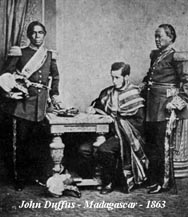
The following appears in "History of Passaic and Its Environs"
by Walter W. Scott, Vol. III, published by Lewis Historical Publishing Company, Inc.., New
York, 1922 located in the Passaic Public Library, Passaic, New Jersey.
John Duffus, son of John Henderson Duffus of Dundee, Scotland and referred to above,
was born at the family home in the city of Dundee, October 11, 1840. Having been left as
an orphan at a tender age, his first ten years were under the care of his foster mother,
and thereafter under the care and sympathy of a step-mother, after the second marriage of
his father. His early educational training was acquired in the schools of his native city,
and while in yet his boyhood years he developed a desire and longing for a seafaring life,
which had been graphically pictured to him by his uncle, George Duffus, who had himself
been a seafaring man for many years. The boy, having seized upon the first opportunity
that presented itself, arranged for a trip to a foreign port on one of the vessels leaving
the port of Dundee, thinking that from that time in his life would be one of possible
romance and adventure. An experience, however, after six months on board a trading vessel
largely dispelled his illusions, and he yielded not reluctantly to the solicitations of
his father to return home and enter high school. Soon after his return to the parental
roof, and after laying aside his school books, he decided to learn the art and technique
of the carpenter and at once entered upon his newly chosen work. This, however, did not
prove entirely congenial to his tastes and expectations; he developed a desire to enter
into missionary work and service of the Cross. He discontinued his chosen avocation, and
assiduously applied himself to the preparation for entrance to college, and in due time
was admitted to Bedford College, England, where in the course of time he became a
proficient scholar, and after his graduation preached his first missionary sermon in Ward
Chapel, in his native city, where he had formerly worshipped in his early boyhood days.
His ambition was to follow in the footsteps of such men as Livingston and Moffat, and he
accordingly lost no time in applying to the London Missionary Society for an appointment,
and in the due course of time was sent to the Island of Madagascar. In entering upon his
newly chosen work, he applied himself to the duties thereof with enthusiastic devotion,
having mastered the native language in about one year. This greatly increased the scope of
his influence among the people of the Island which might have developed to a considerable
degree had not an event occurred which changed the whole course of his life.
The new King had just come to the throne of Madagascar who for a time was the idol of
the people, for he had inaugurated many reforms of a civic and religious character.
Unfortunately, however, the King was surrounded by evil advisers, who soon let him into
dissolute habits. This had an alarming effect upon the better element of society on the
Island, which besought the King to relinquish his evil associates, and to abrogate the
treaty, which they had induced him to make with France.
The King disregarded the solicitations and good advice of his subjects, and in
consequence the people rose in revolt. Their mandate henceforth was "Redress and
Reform." The King having refused to accede to the demands of the people, he was
dragged from the palace and assassinated. The next day following this tragic event, his
widow Rasoherina was proclaimed Queen, amidst the plaudits of the populace. A new
constitution was duly ratified on the same day, and the inviolability of the soil of
Madagascar was duly declared, and that the sovereign had no right to dispose of any part
of it. This action interfered with the French Government, who had threatened to resort to
force if the new govern ment under the Queen should withhold its consent to the
continuance of treaty privileges. These radical changes brought about a state of chaos and
enmity on both sides, and after weary months of fruitless negotiations, the Queen, with
the consent of her advisors, appointed John Duffus "Rainfirengria-
Rainandriandrianna." an embassy duly accredited to the courts of Napoleon the Third
and Queen Victoria
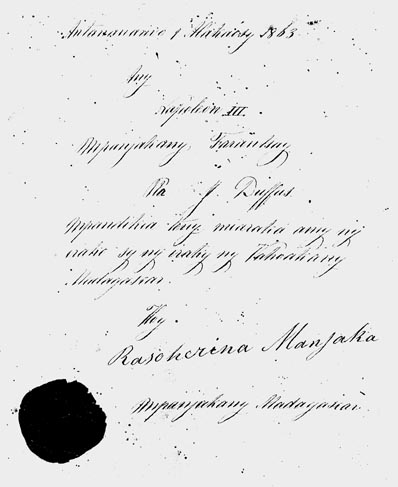
letter of introduction to Courts of Napoleon III
.
The French Government received Rosoherina's representatives with icy coldness, and
plainly intimated to them that their presence on French soil was unwelcome. In England
they were courteously received, were entertained by nobility, and introduced into various
diplomatic circles, and were also presented to Queen Victoria at Buckingham Palace.
Nevertheless, the British Government refused to intervene in their behalf with the French
Government.
The failure of their mission was a sore disappointment to the Madagascar
representatives, for they well knew that censure, if not vengeance, awaited their return
to Madagascar. Mr. Duffus, as a member of the Mission, realizing that in his own case at
least, discretion might prove the better part of valor, took leave of his associates at
Suez, and returned to England as a private citizen.
A few months later, John Duffus decided to sail for America, and immediately upon his
arrival here traveled throughout the various states before permanently settling in the
then fast developing town of Passaic, New Jersey, where he found favorable opportunities
for advancement. He accordingly engaged in the real estate and insurance business, having
met with a marked degree of success from the beginning. His reputation and influence soon
became recognized by his fellow citizens, and he was elected to the office of city clerk,
and also that of justice of the peace. Mr. Duffus later settled in New York City, where he
had been a resident for a period of over twenty years, and there engaged in clerical work.
During his spare hours he occasionally contributed articles to the public press, and in
the course of time became noted as a writer of lay sermons. He frequently, while in a
reminiscent mood, lamented the fact that he did not re-enter the ministry when he returned
to England, and could have carried the message of salvation to some heathen land.
In his church connections, John Duffus was broadminded, and was entirely free for
servility of creed or form. During the many years of his active life he held membership
with several church denominations, but singularly enough, he had with his devoted wife,
for the past six years been members of the Broadway Tabernacle, thus ending as he began in
the Congregational faith. It can be correctly stated, however, that through all the
vicissitudes of his life his faith in God never wavered.
John Duffus had twice married. His first wife, whose maiden name was
Georgie Mott, was born August 31, 1845, died October 10, 1880, the daughter of Benjamin
and Louisa Mott, of Long Island. Of this union were born two sons, John R., and George S,
of whom further. He married (second), his wife having survived him at the time of his
death, which occurred February 20, 1912, in the City of New York.
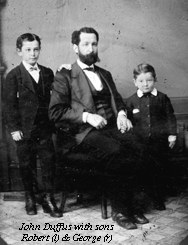
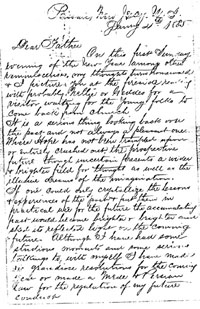
Click on letter from John Duffus to his father,
John Henderson Duffus, on January 4, 1885.

See John Duffus of Banff, Banffshire, Scotland
tree (John6)
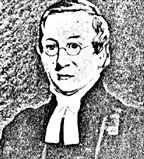
Click on photo for article about the Reverend John Duffus
For the Reverend John
Duffus' 1838 Journal click here!

See George Duffus of Banff,
Scotland - The Australian Duffuses (George1)
John Denis Duffus was born September 26th 1933 and educated at Boorhaman State School
and then at Xavier College, Kew from 1944-1951. He then studied pharmacy, qualifying in
1954. He then entered Corpus Christi College, Werribee, to study for the priesthood. Fr.
John Duffus was ordained at St. Patrick's Wangaratta on 21st July, 1962 by the Most Rev.
Dr. Bernard Stewart, Bishop of Sandhurst. Fr. John Duffus was curate at Kennington,
Benalla and Wangaratta after which he spent seven years teaching at Alexeshafen and Port
Moresby seminaries in New Guinea before studying again in Washington, D.C., U.S.A. and
Rome before returning to be Bishop Stewards secretary and assistant. When Bishop Slewart
retired, Fr. John Duffus continued to assist Bishop Noel Daley in the same position at the
Sacred Heart Cathedral, Bendigo.
Fr. John Duffus was elevated to the title of Monsignor "Prothonotary
Apostolic" by Pope John Paul II on Sunday, 7th July, 1991.
| awards | celtic
links | chat | contents |crest | dedication |
DNA-Y line | duffus
2000 | family trees | gaelic
links |
| genealogy | links | |main
index | sunday news- past issues | tartans |videos |

COPYRICHT
Aa richts is pitten by. Nae pairt o this darg shuid be doobelt, hained in onie kin o
seestem, or furthset in onie kythin or bi onie gate whitsomeiver, athoot haein leave
frae the writer afore-haund.
©
2003 David Duffus. All rights reserved.
Design by David Duffus
|





